- Home
- Colleen Hoover
Verity Page 23
Verity Read online
Page 23
Crew seems to be adjusting well. We did put him in therapy, and Jeremy sometimes worries it’ll do more harm than good, but I reassure him of all the good therapy did for me as a child. I have faith that Crew will easily forget the bad memories if we give him enough good ones to cover them up with.
Today is the first time we’ve stepped foot in their old house in months. It’s eerie, but necessary. I’m getting too close to my due date to travel again, so we’re using this opportunity to clear out the house. Jeremy has received two offers on it already, and we don’t want to have to drive back up here during my last month of pregnancy to empty it out.
The office was the hardest room to clear out. There was so much stuff that probably could have been salvaged, but Jeremy and I spent half the day putting everything through the shredder. I think we both just want that part of our lives to be over. Gone. Forgotten.
“How are you feeling?” Jeremy asks. He walks into the office and places a hand on my stomach.
“I’m good,” I say, smiling up at him. “You almost finished?”
“Yep. A few more boxes on the porch and we’ll be done.” He kisses me, just as Crew runs into the house.
“Stop running!” Jeremy calls out over his shoulder. I push myself out of the desk chair and follow Jeremy with it as I roll it toward the door. He grabs one of about ten boxes left on the porch and begins to carry it to the car. Crew slips around me to run outside, but pauses, then comes back into the house.
“I almost forgot,” he says, rushing toward the stairs. “I have to get my stuff out of mom’s floor.”
I watch as he runs upstairs, toward Verity’s old bedroom. It was empty last time I checked. But a moment later, Crew comes walking downstairs with papers in his hand.
“What are those?” I ask him.
“Pictures I drew for my mom.” He shoves them in my hands. “I forgot she used to keep them in the floor.”
Crew runs outside again. I look down at the pictures in my hands. The old familiar feeling I carried around with me while staying in this house has returned. Fear. Everything starts flashing through my head. The knife that was on the floor in Verity’s room. The night I saw her on the monitor, on her hands and knees, like she was digging at the floor. Crew’s passing words just now.
I forgot she used to keep them in the floor.
I rush up the stairs. And even though I know she’s dead and isn’t in there, I’m still terrified as I walk down the hallway to her room. My eyes fall to the floor, to a piece of wood Crew failed to put back in place after he took out his pictures. I kneel down and pick up the loose piece of flooring.
There’s a hole in the floor.
It’s dark, so I reach my hand inside and feel around. I pull out something small. A picture of the girls. I pull out something cold. The knife. I reach in again and feel around until I find an envelope. I open it and pull out a letter, then drop the empty envelope to the floor next to me.
The first page is blank. I blow out a steady breath and lift it, revealing the second page.
It’s a handwritten letter to Jeremy. Fearfully, I begin to read.
Dear Jeremy,
I hope it’s you who finds this letter. If it isn’t you, I hope it will get to you somehow because I have a lot to say.
I want to start off with an apology. I’m sure by the time you read this, I’ll have left in the middle of the night with Crew. The thought of leaving you alone in the home where we shared so many memories together makes me ache for you. We had such a good life with our children. With each other. But we’re Chronics. We should have known our heartache wouldn’t end with Harper’s death.
After years of being the perfect wife to you, I never expected this career that I love and devote most of my time to would ultimately be what ended us.
Our lives were perfect until we somehow flipped into an alternate dimension the day Chastin died. As much as I try to forget where it all started to go wrong, I was cursed with this mind that never forgets a single thing.
We were in Manhattan having dinner with my editor Amanda. You were wearing that thin grey sweater I loved—the one your mother bought you for Christmas. My first novel had just released and I signed the new two-book deal with Pantem, which is why we were at that dinner. I was discussing my next novel with Amanda. I don’t know if you tuned this part of the conversation out, but I’m guessing you did because writer talk always bored you.
I was expressing my concerns to Amanda because I wasn’t sure which angle to take with the new book. Should I write something completely different? Or should I stick to the same formula of writing from the villain’s point of view that made my first novel so successful?
She suggested I stick to the same formula, but she also wanted me to take even more risks with the second book. I told her it was difficult for me to make a voice in my novel sound authentic when it wasn’t at all how I think in my everyday life. I was worried I wouldn’t be able to improve my craft with the next book.
That’s when she told me to try an exercise she learned in grad school called antagonistic journaling.
This would have been a great time for you to be paying attention at that dinner, but you were on your phone, probably reading an eBook that wasn’t mine. You caught me staring and you looked up at me, but I just smiled at you. I wasn’t mad. I was happy you were there with me and being patient while I received advice from my new editor. You squeezed my leg under the table, and I directed my attention back to Amanda, but my focus was on your hand as it trailed circles around my knee. I couldn’t wait to get back to our place that night because it was our first night away from the girls together, but I was also very interested in the advice Amanda was giving me.
She said antagonistic journaling was the best way to improve my craft. She said I needed to get into the mind of an evil character by writing journal entries from my own life. . . things that really happened. . . but to make my inner dialogue in the journal entry be the opposite from what I was actually thinking at the time. She told me to start by writing about the day you and I met. She said I should write down what I was wearing, where we met and what our conversation was that night, but to make my inner dialogue more sinister than it actually was.
It sounded simple. Harmless.
I’ll give you an example from a paragraph I just wrote above.
I look over at Jeremy, hoping he’s paying attention. He isn’t. He’s staring down at his fucking phone again. This dinner is a huge deal for me. I realize this isn’t Jeremy’s scene—these fancy dinners and meetings in Manhattan—but it’s not like I force him to do this all the time. Instead, he’s reading someone else’s eBook, being completely disrespectful to this entire conversation.
He reads all the time, yet he doesn’t feel comfortable reading MY books? It’s an insult in the highest form.
I’m so embarrassed by his audacity, but I know I need to mask my embarrassment. If Amanda notices the irritation on my face, she might notice Jeremy’s disrespect.
Jeremy looks up at me, so I force a smile. I can save my anger for later. I give my attention back to Amanda, hoping she doesn’t notice Jeremy’s behavior.
A few seconds later, Jeremy squeezes my leg, right above my knee, and I stiffen beneath his touch. Most of the time, I crave it. But in this moment the only thing I crave is a husband who supports my career.
And that’s how easy it is for a writer to pretend to be someone they aren’t.
As soon as we got back to our place, I went straight to my laptop and wrote about the first night we met. I pretended my red dress was stolen in my alternate version. I pretended I was there to hopefully fuck rich men, which was absolutely not true. You should know me better than that, Jeremy.
I wasn’t very good at making myself much of a villain the first time I tried it, so I made it a habit of writing down our milestone moments. I wrote about the night you proposed to me, the night I found out I was pregnant, the day I gave birth to the girls. Every time I wrote about a
new milestone, I got better and better at being inside the mind of a villain. It was exhilarating.
And it helped.
It helped immensely, which is why I was able to create such realistic, terrifying characters in my novels. It’s why they sold, because I was good at it.
By the time I had finished my third novel, I felt I had mastered the craft of writing from a point of view that wasn’t at all mine. The exercises had helped me so much, I decided to combine all of my journal entries into an autobiography that could be used to teach other authors how to master their craft. I needed to tie the chapters together with an overall storyline so that the autobiography was more cohesive, so I pushed the envelope with every scene to make it more jarring. More disturbing.
I don’t regret writing it because my only intention was to eventually help other writers, but I do regret writing about Harper’s death just days after it happened. My mind was in such a dark space though, and sometimes, as a writer, the only way to clear your mind is to let the darkness spill out onto a keyboard. It was my therapy, no matter how hard that may be for you to understand.
Besides, I never thought you would read it. Beyond that first manuscript, you never read anything I wrote.
So why...why did you choose to read that one?
It was never meant for anyone to read and believe. It was an exercise. That’s it. A way to tap into the dark grief that was eating at me and eliminating it with every stroke of the keyboard. Putting all the blame onto this fictional villain I had created in that autobiography was one of the ways I coped.
I know this letter is hard for you to read, but it can’t be any harder than the manuscript was to read the night you found it. And if we’re ever going to come to a place of forgiveness, you need to keep reading so you’ll know the absolute truth about that night. Not the version you discovered days after Harper died.
When I took Harper and Crew out on the lake that day, I was trying to be good for them. That morning, you mentioned how I didn’t play with them anymore, and you were right. It was so hard because I missed Chastin so much, but I also had these two beautiful children who still needed me. And Harper really did want to go to the water that day. It’s why she ran upstairs crying, because I had told her no. I never scolded her for her lack of emotions like I stated in the manuscript. I was using artistic freedom to further the plot. It’s an insult that you believe I would speak to one of our children that way. It’s an insult that you believe any of that manuscript—or that I was capable of harming them.
Harper’s death was an accident. Her death was an accident, Jeremy. They wanted to go in the canoe, and it was so beautiful that day. And yes, I should have put life vests on them, I realize that. But how many times had we gone in that boat without them? The water wasn’t that deep. I had no idea the fishing net was beneath the surface. If it weren’t for that fucking fishing net, I would have found her and helped her to shore and we all would have laughed about the day the boat tipped over.
I can’t even tell you how sorry I am for not doing everything, anything differently that day. If I could go back, I would, and you know I would.
When you got there and pulled her out of the water and held her, I wanted to rip my heart out and feed it to you because I knew you no longer had one of your own. I didn’t want to live for another second after seeing your anguish. My God, Jeremy. To lose both of them. Both of them.
I watched your suspicion come to a head a few nights after Harper passed. We were in bed when you started asking me all those questions. I couldn’t even believe you would think I would do something like that on purpose. And even if it was a fleeting thought, I saw the love you had for me leave your body and flitter away like it was never even there. Our entire past…all the great moments we shared together. It just left.
Because, yes, I did tell Crew to hold his breath. I told him to hold his breath as the canoe was tipping over. I was trying to help him. I thought Harper would be fine because we’ve played in that lake many times before, so my focus was on Crew after we fell into the water. I grabbed him and he was panicking, so I tried to make it back to the dock as fast as I could before he caused us both to drown. Not even thirty seconds had passed before I realized Harper wasn’t right behind us.
To this day, I blame myself. I was her mother. Her protector. And I assumed she’d be fine, so I focused on Crew for thirty seconds too long. I immediately tried to swim back and find her, but the canoe had shifted farther out because of the commotion of the water. I couldn’t even find where she’d gone under, and Crew was still fighting me—panicking. I knew if I didn’t get him to the shore in that exact moment, all three of us would drown.
I searched for her with everything in me, Jeremy. You have to believe me. Every part of me drowned in that lake with her.
I didn’t blame you for suspecting me. I probably would have allowed my mind to explore every possible scenario if the roles had been reversed and she drowned under your supervision. It’s natural, to assume the worst in people, even if that assumption is only for a split second.
I thought you’d wake up the next day after our conversation in the bed and you would realize how ridiculous your indirect accusation had been. I didn’t even try to change your mind that night because I was too full of grief to care. To argue. It had only been days since she passed, and I honestly just wanted to die. I wanted to walk out into the lake that night and join her, because her death was my fault. It was an accident, yes. But if I’d made her wear a vest, if I’d been able to grab her and Crew together, she’d still be alive.
I couldn’t sleep, so I went to my office and opened my laptop for the first time in over six months.
Imagine it for a moment. A mother, grieving the loss of both of her daughters, writing a fictional work-up that accused one of them of murdering the other.
It was beyond disturbing. I realize that, which is why I cried the entire time I typed. But I thought, maybe, if I released my guilt and my grief onto this fictional villain I had created, it would somehow help me in a twisted way.
I wrote all about Chastin’s death. I wrote all about Harper’s. I even went back to the beginning of the manuscript and added foreshadowing so the entire thing would match our new grim reality. And in a way, it did help ease a small fraction of my guilt and pain, being able to blame this fictional version of myself rather than accept the blame in real life.
I can’t explain the mind of a writer to you, Jeremy. Especially the mind of a writer who has been through more devastation than most writers combined. We’re able to separate our reality from fiction in such a way that it feels as if we live in both worlds, but never both worlds at once. My real world had grown so dark that I didn’t want to live in it that night. It’s why I escaped from it and spent the night writing about a world darker than the one I was living in. Because every time I worked on that autobiography, I found relief in closing the laptop. I found relief in walking out of my office and being able to close the door on the evil I created.
That’s all it was. I needed for the imaginary version of my world to be darker than my real world. Otherwise, I would have wanted to leave them both.
After spending the entire night and some of the morning working on the manuscript, I finally reached the last page. I felt the manuscript was done at that point because, really, what more could I have added? It felt as though our world was over. The end.
I printed it out and stuffed it away in a box, thinking one day in the future I’d get back to it. Maybe add an epilogue. Maybe I would burn it. Whatever the plan was, I was not expecting you to somehow read it. I was not expecting you to believe it.
After being up all night writing, I slept most of the day. When I finally woke up that night, I couldn’t find you. Crew was already asleep, but you weren’t up there with him. I was standing in the hallway wondering where you had disappeared to when I heard a noise in my office.
The noise was you. I’m not sure what kind of sound you had made, but it was worse
than either of the days we found out the girls had died. I walked toward my office to console you, but I stopped short before opening the door because your cries had turned into rage. Something crashed against the wall. I jumped back—wondering what was happening.
That’s when I remembered the laptop. The autobiography was the last file I had opened.
I swung open the door to explain what I knew you had just read. I’ll never forget the look on your face as you stood there and looked at me from across the room. It was complete and utter…misery.
Not like the sadness of someone who just found out one of their children died. It was a consuming sadness, like every happy memory we had ever had as a family was erased with every new word of that manuscript you had read. Gone. There was nothing left inside you but hatred and destruction.
I shook my head, tried to speak. I wanted to say, “No. It’s not true, Jeremy. It’s okay, it’s not true.” But all I could get out was a fearful and pathetic, “No.”
The next thing I knew, you were dragging me by my throat to the bedroom. I was no match for your strength as you held my arms down with your knees and squeezed my throat even tighter.
If you’d given me five seconds. Just five seconds to explain, I could have saved us. I tried so hard to say, “Just let me explain,” but I couldn’t breathe.
I’m not sure what the sequence of events was after that. I know I passed out. Maybe you panicked because you realized you had almost killed me. If I had died on that bed, you would have been arrested for my murder. Crew wouldn’t have a father.
I woke up in the passenger seat of my Range Rover and you were behind the wheel. There was tape on my mouth, and my hands and feet were bound together. Again, I just wanted to explain that what you read wasn’t true—but I couldn’t talk. I looked down and realized I didn’t have on a seatbelt. And in that moment, I knew what you were doing.
It was one simple sentence in my manuscript, about how I should turn off the passenger airbag and drive my car into a tree while Harper was unbuckled so her death would look like an accident.

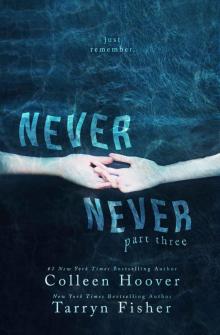 Never Never: Part Three
Never Never: Part Three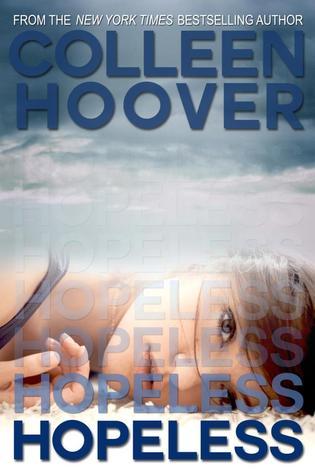 Hopeless
Hopeless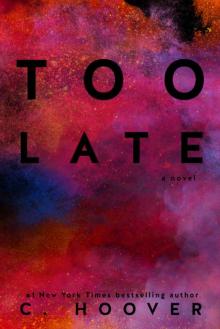 Too Late
Too Late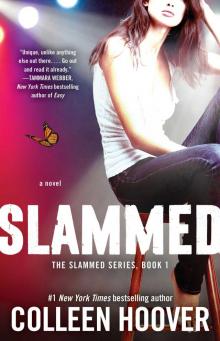 Slammed
Slammed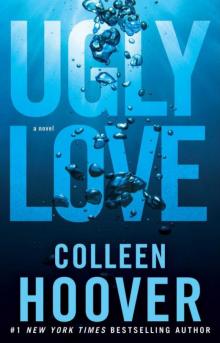 Ugly Love
Ugly Love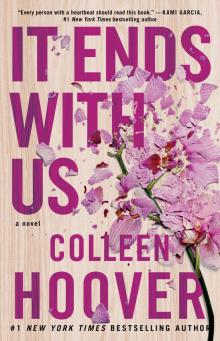 It Ends With Us
It Ends With Us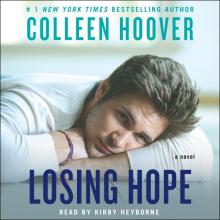 Losing Hope
Losing Hope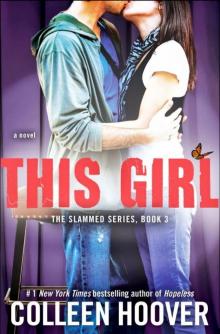 This Girl
This Girl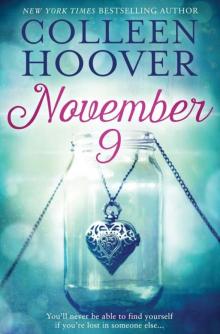 November 9
November 9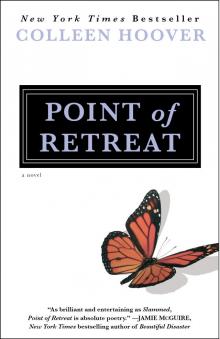 Point of Retreat
Point of Retreat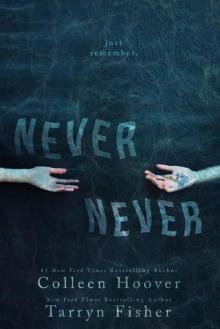 Never Never
Never Never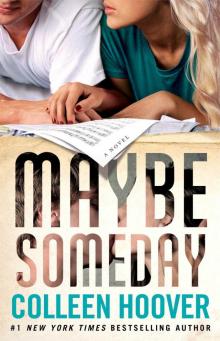 Maybe Someday
Maybe Someday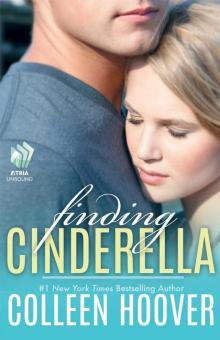 Finding Cinderella
Finding Cinderella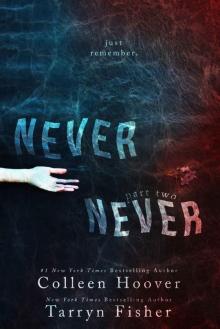 Never Never: Part Two
Never Never: Part Two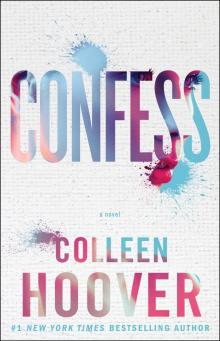 Confess
Confess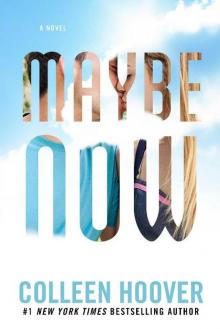 Maybe Now (Maybe #2)
Maybe Now (Maybe #2)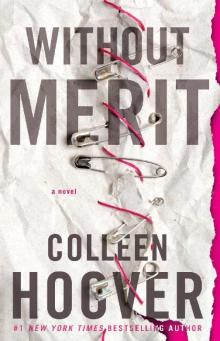 Without Merit
Without Merit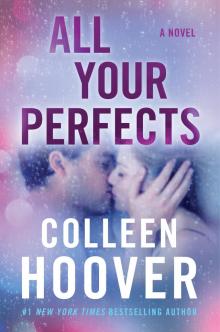 All Your Perfects
All Your Perfects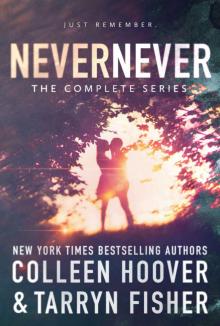 Never Never: The Complete Series
Never Never: The Complete Series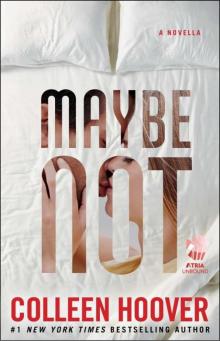 Maybe Not
Maybe Not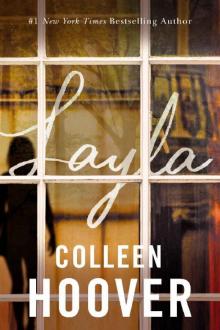 Layla
Layla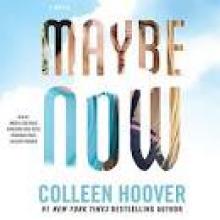 Maybe Now (Maybe Someday part two)
Maybe Now (Maybe Someday part two)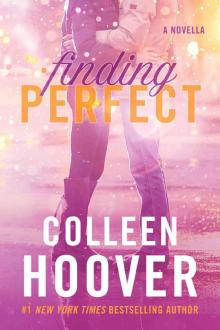 Finding Perfect
Finding Perfect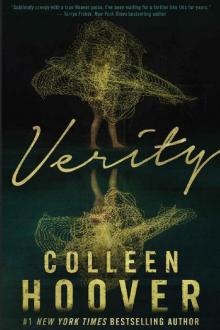 Verity
Verity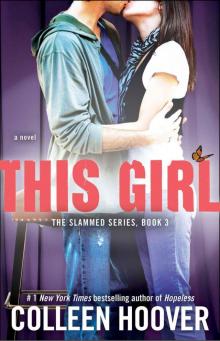 This Girl: A Novel
This Girl: A Novel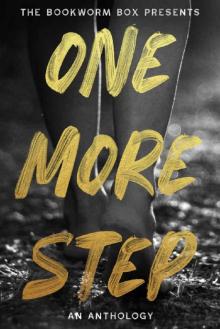 One More Step
One More Step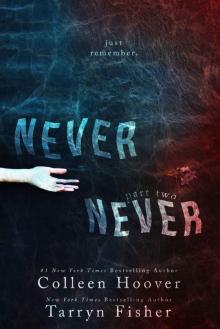 Never Never: Part Two (Never Never #2)
Never Never: Part Two (Never Never #2)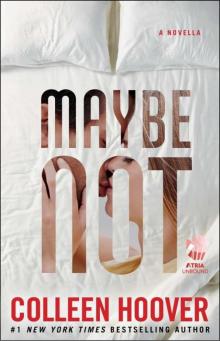 Maybe Not (Maybe #1.5)
Maybe Not (Maybe #1.5)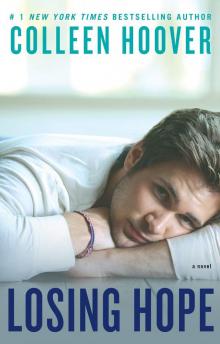 Losing Hope: A Novel
Losing Hope: A Novel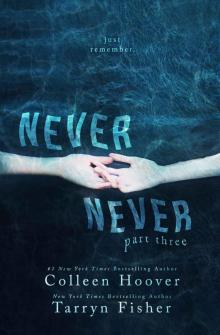 Never Never: Part Three (Never Never #3)
Never Never: Part Three (Never Never #3)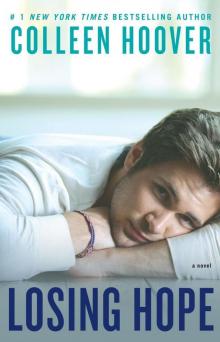 Losing Hope h-2
Losing Hope h-2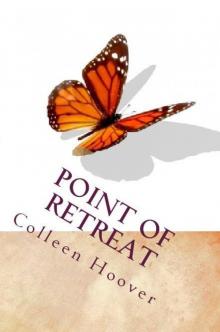 Point of Retreat (Slammed Series)
Point of Retreat (Slammed Series)